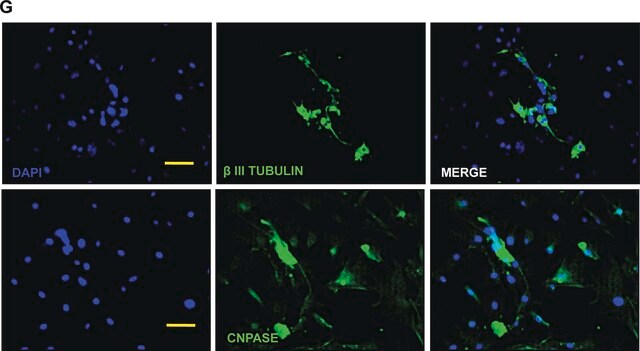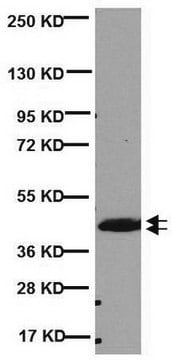추천 제품
생물학적 소스
mouse
Quality Level
결합
unconjugated
항체 형태
ascites fluid
항체 생산 유형
primary antibodies
클론
11-5B, monoclonal
포함
15 mM sodium azide
종 반응성
mouse, rat, bovine, canine, pig, human, rabbit, sheep
반응하면 안 됨
guinea pig, chicken
기술
immunohistochemistry: suitable using brain sections
indirect ELISA: suitable
microarray: suitable
western blot: 1:500 using fresh bovine brain extract
동형
IgG1
UniProt 수납 번호
배송 상태
dry ice
저장 온도
−20°C
타겟 번역 후 변형
unmodified
유전자 정보
human ... CNP(1267)
mouse ... Cnp(12799)
rat ... Cnp(25275)
관련 카테고리
일반 설명
CNPase (2′,3′-cyclic nucleotide 3′-phosphodiesterase, E.C.3.1.4. 37) is a unique enzyme. It is a constituent of cells that elaborate myelin in the central and peripheral nervous systems, i.e. oligodendrocytes and Schwann cells respectively, and is virtually absent in other cell types in the nervous system.
The enzyme isolated from mammalian brain is primarily a mixed dimer of approximately 94 kDa. The dimer consists of a varied proportion of CNP1 (46 kDa) and CNP2 (48 kDa) subunits in various species. The high levels of CNPase observed in oligodendrocytes and Schwann cells portend a vital role of this enzyme in the normal function of these cells. They are distinguished from nearly all other cells by their ability to synthesize and maintain vast amounts of multilamellar membrane, known as myelin. It seems very likely that CNPase is expressed at high levels in these particular cells to facilitate the elaboration and maintenance of myelin or to carry out functions imposed or afforded by the unique membrane structure of myelin. Since the enzyme is a myelin-associated enzyme, it is of considerable interest in the study of diseases and disorders in which myelin is affected, such as multiple sclerosis, subacute sclerosing panencephalitis, acquired immunodefi ciency with CNS involvement, peripheral neuropathies, etc. Another important use is the study of reinnervation of the neuromuscular junction and the identification of oligodendrocyte progenitor cells, very early in postnatal development.
The enzyme isolated from mammalian brain is primarily a mixed dimer of approximately 94 kDa. The dimer consists of a varied proportion of CNP1 (46 kDa) and CNP2 (48 kDa) subunits in various species. The high levels of CNPase observed in oligodendrocytes and Schwann cells portend a vital role of this enzyme in the normal function of these cells. They are distinguished from nearly all other cells by their ability to synthesize and maintain vast amounts of multilamellar membrane, known as myelin. It seems very likely that CNPase is expressed at high levels in these particular cells to facilitate the elaboration and maintenance of myelin or to carry out functions imposed or afforded by the unique membrane structure of myelin. Since the enzyme is a myelin-associated enzyme, it is of considerable interest in the study of diseases and disorders in which myelin is affected, such as multiple sclerosis, subacute sclerosing panencephalitis, acquired immunodefi ciency with CNS involvement, peripheral neuropathies, etc. Another important use is the study of reinnervation of the neuromuscular junction and the identification of oligodendrocyte progenitor cells, very early in postnatal development.
특이성
Monoclonal Anti-CNPase reacts specifically with CNPase in ELISA, immunoblotting and immunohistochemical staining of brain sections. In an immunoblotting assay, the antibody localizes both CNP1 (46kD) and CNP2 (48kD) bands of the enzyme and recognizes whole brain CNPase of human, bovine, mouse, rat, rabbit, dog, sheep and pig but not guinea pig or chicken. Immunohistochemical staining performed on paraffin, cryostat, or vibratome sections of rat brain, reveals a selective staining of oligodendrocytes in the grey and white matter. Nerve cells and axons are not stained and astroglial cells do not appear to be labeled.
The antibody reacts specifically with CNPase in oligodendrocytes and Schwann cells. Recognizes whole brain CNPase. Nerve cells, axons, and astroglial cells do not appear to be labeled. Using immunoblotting techniques, the antibody localizes both CNP1 and CNP2 bands of the enzyme.
면역원
human 2′,3′-cyclic nucleotide-3′-phosphodiesterase (E.C.3.1.4.37, CNPase).
애플리케이션
Monoclonal Anti-CNPase may be used for the localization of CNPase using various immunochemical assays such as ELISA, immunoblot, dot blot and immunocytochemistry. It has also been used in immunohistochemistry.
면책조항
Unless otherwise stated in our catalog or other company documentation accompanying the product(s), our products are intended for research use only and are not to be used for any other purpose, which includes but is not limited to, unauthorized commercial uses, in vitro diagnostic uses, ex vivo or in vivo therapeutic uses or any type of consumption or application to humans or animals.
Not finding the right product?
Try our 제품 선택기 도구.
Storage Class Code
11 - Combustible Solids
WGK
WGK 1
시험 성적서(COA)
제품의 로트/배치 번호를 입력하여 시험 성적서(COA)을 검색하십시오. 로트 및 배치 번호는 제품 라벨에 있는 ‘로트’ 또는 ‘배치’라는 용어 뒤에서 찾을 수 있습니다.
Deficiency of schnurri-2, an MHC enhancer binding protein, induces mild chronic inflammation in the brain and confers molecular, neuronal, and behavioral phenotypes related to schizophrenia
Takao K, et al.
Neuropsychopharmacology, 38(8), 1409-1409 (2013)
Oligodendrocytes are damaged by neuromyelitis optica immunoglobulin G via astrocyte injury
Marignier R, et al.
Brain, 133(9), 2578-2591 (2010)
Fulminant JC virus encephalopathy with productive infection of cortical pyramidal neurons
Wuthrich C, et al.
Annals of Neurology, 65(6), 742-748 (2009)
Natalia D Andersen et al.
Scientific reports, 6, 31781-31781 (2016-08-24)
We herein developed a protocol for the rapid procurement of adult nerve-derived Schwann cells (SCs) that was optimized to implement an immediate enzymatic dissociation of fresh nerve tissue while maintaining high cell viability, improving yields and minimizing fibroblast and myelin
Raffaela Cipriani et al.
Journal of neuroinflammation, 14(1), 147-147 (2017-07-26)
FTY720 (fingolimod, Gilenya™) is an oral, blood-brain barrier (BBB)-passing drug approved as immunomodulatory treatment for relapsing-remitting form of the multiple sclerosis (MS). In addition, FTY720 exerts several effects in the central nervous system (CNS), ranging from neuroprotection to reduction of
자사의 과학자팀은 생명 과학, 재료 과학, 화학 합성, 크로마토그래피, 분석 및 기타 많은 영역을 포함한 모든 과학 분야에 경험이 있습니다..
고객지원팀으로 연락바랍니다.








